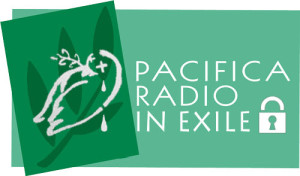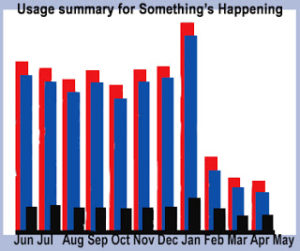Berkeley-At Thursday’s national board meeting, the majority spent most of the meeting passing a resolution instructing station management to “run their operations more productively” by such actions as calling credit card donors whose credit cards don’t go through and encouraging past donors to renew. Houston listener rep Bill Crosier attempted to amend the resolution to also address the content being broadcast. He proposed rolling back program changes in the last 12 months that generated less net fund drive revenue than the pre-change content.
But the majority revolted and offered rationalizations for failing to address what is actually being broadcast on the stations as subscriber numbers continue to decline. Crosier’s amendment, a restating of founder Lewis Hill’s theory of listener-sponsored radio said “reverse any programming changes made in the last twelve months that resulted in a decrease in listener support, and to put programs with a track record of good listener support into time slots which typically have more radio listeners and/or to give those programs more time in the schedule, and to implement this by the June 2 PNB meeting”.

Hill’s essay on the theory of listener-sponsored radio can be read here. Among other observations: “Certainly when we develop the idea of broadcasting to this point, the listener is the only one discernible who has a real stake in the outcome. It must have occurred to you that such a principle could easily revert to the fabled ivory tower. Some self-determining group of broadcasters might find that no one, not the least minority of the minority audiences, gave a hang for their product. What then? Then, you will say, there would be no radio station—or not for long—and the various individualists involved could go scratch for a living. But it is the reverse possibility that explains what is most important about listener sponsorship. We make a considerable step forward, it seems to me, when we use a system of broadcasting which promises that the mediocre will not survive. But the significance of what does survive increases in ways of the profoundest import to our times when it proceeds from voluntary action. Anyone can listen to a listener-sponsored station. Anyone can understand the rationale of listener sponsorship—that unless the station is supported by those who value it, no one can listen to it including those who value it. But beyond this, actually sending in the subscription, which one does not have to send in unless one particularly wants to, implies the kind of cultural engagement that is surely indispensable for the sake of the whole culture”.
Listener support donations at the five stations plummeted in 2015 by 16%, a loss of $1.6 million dollars in a single year, after hovering at the $10 million mark for the previous five years. This sudden drop in listener support was in addition to the failure to collect Corporation for Public Broadcasting grant funds now totaling over two million dollars due to late financial audits from 2014-2016. Brian Edwards-Tiekert of KPFA moved to strike the language supporting listener-sponsorship in favor of management-driven program choices.

The board’s only other action on May 5th was to retroactively add $15,000 in salary for a national election supervisor to conduct the 2016 election which had been left out of the partial budget. The correction was made, as stated, “because of” the Yeakey vs. Pacifica lawsuit. The partial budget, which remains unofficial because no budgets were ever done for the two East Coast stations, had been sitting for months at the national finance committee and then at the full board. None of the 25 pairs of eyes noticed there was no allocation to pay for the election administrator. No one has been hired to do the job. June 1st (23 days from now) is the bylaws-deadline to open nominations. The national board is not scheduled to meet again until June 2nd.
On May 5th, Yeakey vs Pacifica, which seeks to remove 7 national board members whose elected terms expired in December 2015 and 2 affiliate representatives whose stations are not currently affiliated with Pacifica, was held over for a trial beginning on July 6th. The continuation is caused by Siegel and Yee, Pacifica’s unofficial corporate counsel, who characterized the request for injunctive relief as a shareholders derivative suit, a much more complicated legal process used to remove board members for negligent behavior and recover financial damages from them. Yeakey vs Pacifica asks for no financial damages. Pacifica’s law firm is demanding a $50,000 bond be put up by the two listener-member plaintiffs in order to have their request heard. The complaint can be seen here. The actions of Siegel and Yee may quadruple or quintuple Pacifica’s legal costs by pushing forward to a trial and may result in the board members squatting on expired terms “charging” Pacifica several thousand dollars each to hang on to their board seats for a few more months. Pacifica will be back in court on the East Coast on May 20th to address the action that seeks to seat representatives from NY’s WBAI on the national board which has kept them off since the beginning of the year while trying to undo the independent majority on NY’s local board. The East Coast complaint can be seen here.
Independent board members Grace Aaron, Jan Goodman, Bill Crosier and Jonathan Alexander have been persistent in their requests to the board majority to resolve the lawsuits by ending bylaws violations and not squander foundation resources fighting the lawsuits which seek to correct the board of directors roster so it has WBAI representation and all directors are elected.
If you would like to support either or both of the requests from Pacifica members, you can visit the Clean Up Pacifica Project for more information.
A timeline of the now two year old coup by the Siegel/Brazon faction can be seen here.
The latest report back on the FY 2014 audit, still not finished despite being on the “cusp of completion” for the last three months, can be found here. The 10 minute report from Pacifica’s May 3rd audit committee meeting contains status updates from auditor Armanino and CFO Agarwal read out loud. The long and short of it is that Pacifica owes $75K on 2014 audit work to date and there are still outstanding items that have not been verified. There is no agreement in place with the Empire State Building and will not be until the completion of the 2014 audit (despite a year and a half of reported secret negotiations). The CFO says the accounting records are in “no state” to begin a 2015 financial audit.

The inability to get caught up on the back audits, which began running literally a year behind schedule after the Siegel/Brazon coup in March of 2014, is preventing any effort to update the ineffective accounting system, which among other problems, uses an awkward mixture of cash and accrual accounting and does not reconcile records kept in the donation database Memsys with general ledger records in the Microsoft Dynamics/Great Plains accounting software.
As everything old is new again, this list of financial transparency resolutions passed by the Pacifica National Board in December of 2004, 11 and a half years ago and never enforced, reveal the long-term duration of the financial reporting problems. On review of the document, a former board treasurer commented wearily: “I actually got at least three of these items re-passed during my years, completely unaware they were already standing ignored policy”.
The half-suppressed revelation about mystery lawsuits at DC’s WPFW by local board member Eric Ramey began to come into focus after the written report from DC’s last election supervisor came out. In it, David Levine notes that he resigned from his position on September 18th, 2015 because he was not paid by WPFW or Pacifica at all after beginning work on July 1st. Levine’s resignation for non-payment was not disclosed publicly or to the board of directors, which canceled DC’s election three weeks later on October 6. Levine’s report can be seen here. In it he says:
“I resigned from my position as WPFW Local Election Supervisor on September 18, 2015, after working without pay from July 1-September 18. My contract with Pacifica stated that I would be paid bi-monthly for my work, and I reluctantly resigned after failing to receive any compensation for my work, despite repeated requests seeking pay”.
At Texas station KPFT, the local station board has come to a halt due to a rescinded resignation attempt by a delegate elected in 2012 to a three year term that is holding over into 2016. Maria Elena Castellanos resigned from the local board in March and tried to “take it back” three weeks later in April. The Houston local board canceled its April meeting twice and is next scheduled to meet on May 11th. The practice of trying to reverse a resignation is discouraged by Pacifica’s bylaws which indicate resignations are effective “on their occurrence” and not up for re-evaluation at a later date. As with the other seating snafus throughout the network, the effort is being exerted against an independent candidate trying to occupy a seat they were elected to in the 2015 election.

The website Truthdig.com featured a video that sheds some light on the muddled situation with the former Uprising program launched by Pacifica back in 2002, now rebranded as Rising Up. KPFK manager Leslie Radford broke up the daily public affairs hour in 2015, following instructions from Adam Rice. The video illustrates an at-home production studio built by host Sonali Kolhatkar with a grant collected outside of Pacifica Radio. Previously, $62,000 in proceeds from an Indiegogo campaign for the program were redirected by Margy Wilkinson for operating expenses in 2014. GM Radford broke the program’s contract with Free Speech TV in 2015. The current status quo has LA station KPFK paying Kolhatkar and her producer staff salaries while only broadcasting the program twice a week. In the fund drive that just began in LA, Rising Up’s 8am appearance on May 3rd netted $275 in the most listened-to hour in radio. The 5 day a week 8am broadcasts at Berkeley’s KPFA, which bears no production costs for the program, regularly bring in $3K to $5K an hour. Rising Up’s Berkeley simulcasts displaced locally-generated programs at KPFA in 2014. The mess caused by Wilkinson and Radford has already directed grant funding away from Pacifica, seems to be pushing Rising Up into an eventual exit from Pacifica altogether, and currently financially boosts the KPFA station at KPFK’s direct expense.
KPFK’s other new programming innovation of the last 12 months also isn’t paying off, with the first three day listener support totals for the Safe Harbor block, a melange of midnight to 3am programs based on the liberal use of on-air profanity, totaling an anemic $260 after 9 hours of broadcast. The former all-night program, Something’s Happening, now relegated to an abbreviated 3am to 6am slot, collected $4,800 or 18 times the receipts. The eclectic Something’s Happening, a Los-Angeles institution for decades, was the highest-rated overnight radio program in the nation’s second largest media market, including both commercial and non-commercial competitors. Web analytics for the independent website show a large decrease in visits ater the broadcasts were slashed, showing the ongoing damage to one the few Pacifica Radio programs that was reaching an audience of significant size.
KPFA’s voters, who made Occupy Oakland hero Scott Olsen the 2nd highest votegetter in the 2015 election, probably don’t know that Olsen, who doesn’t reside in the Bay Area full-time, has been barred from participating in discussions and voting at the majority of KPFA’s local board meetings this year, despite setting up a remote link-up for the meetings when not able to be physically present. The governing CA Corporations Code, Section 5211, permits remote participation and Pacifica’s national board of directors meets almost entirely remotely, having not had an in-person meeting since June of 2015. While remote participation can be inappropriate when local board members reside in driving distance and can physically attend board meetings, preventing participation by those who relocate can serve to deny representation to their constituency, which in Olsen’s case is the over 10% of KPFA’s voters who made him their top choice.
This publication’s home on the Internet (www.pacificainexile.org) is starting a Resources page to provide easy one-click access to frequently searched-for and downloaded documents and files. It’s still in the beginning phases, but about two dozen documents are now available, with more to come. If you have any requests for materials you’d like to see there or for posting, send to pacificainexile@gmail.com so we can develop the most useful page possible for those “looking for that thing” moments.
However “organizational darwinism” works out, it is looking like one ugly process. To remind you to keep laughing and keep fighting for a Pacifica Radio that can not only heal itself but also help to heal the world, take 30 minutes to enjoy this Twit Wit radio satire from way back in March of 2014 when Pacifica’s national office was occupied in an effort to keep the network from being dismantled.
**
If you value being kept up to speed on Pacifica Radio news via this newsletter, you can make a little contribution to keep Pacifica in Exile publishing. Donations are secure, but not tax-deductible. (Scroll down to the donation icon).
Pacifica in Exile readers may write to the board at pnb@pacifica.org.
For readers who may wish to do more, any donor to a California-based not for profit organization like Pacifica may file a complaint to the open file at the Registry of Charitable Trusts at the Office of the CA Attorney General. Pacifica’s case number is CT011303. The form and instructions for filing may be downloaded here.
To subscribe to this newsletter, please visit our spanking new website at www.pacificainexile.org
###
Started in 1946 by conscientious objector Lew Hill, Pacifica’s storied history includes impounded program tapes for a 1954 on-air discussion of marijuana, broadcasting the Seymour Hersh revelations of the My Lai massacre, bombings by the Ku Klux Klan, going to jail rather than turning over the Patty Hearst tapes to the FBI, and Supreme Court cases including the 1984 decision that noncommercial broadcasters have the constitutional right to editorialize, and the Seven Dirty Words ruling following George Carlin’s incendiary performances on WBAI. Pacifica Foundation Radio operates noncommercial radio stations in New York, Washington, Houston, Los Angeles, and the San Francisco Bay Area, and syndicates content to over 180 affiliates. It invented listener-supported radio.




At this point, I think the listener sponsors for KPFK should occupy the station until Radford is out. I’ve really had it with the incompetence and shenanigans. I think nobody should give money to a group that can’t even keep books to show where your money is going.